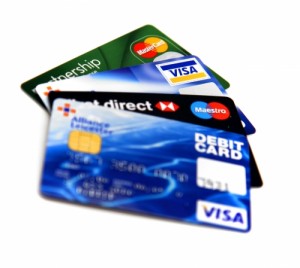Interest rates are the lowest they have been in decades. But there is a little indication the customers of U.A.E. banks are benefiting. This is because banks conveniently reduce the interest rates on deposits according to the market conditions, while forgetting to adjust the credit cards’ interest rates accordingly.
 Banks are very quick to slash long and short-term interest rates and promised to keep them low for years to come. Even if you had agreement for a long term deposit, you can have your interest rates slashed from 2% to 0.75% as for example at Abu Dhabi Commercial Bank, even without a prior notice.
Banks are very quick to slash long and short-term interest rates and promised to keep them low for years to come. Even if you had agreement for a long term deposit, you can have your interest rates slashed from 2% to 0.75% as for example at Abu Dhabi Commercial Bank, even without a prior notice.
Controversially, since 2008, the governments around the world use all measures in order to push all manner of borrowing rates down, and promote lending. The U.S. Federal Reserve recently even promised to keep doing so until 2015, when the country’s economy was consistently creating jobs. And that decision is important to the U.A.E. lenders, because the local currency is pegged to the US dollar.
- Further reading: US Government unveiled open-ended steps to aid economy
In many areas, policy makers’ efforts do appear to be working. Corporate bonds yields, a measure of businesses’ borrowing costs, are half of what they were a few years ago. Car loans are readily available again in U.A.E. with as low as 2.89% interest. Mortgage rates recently hit a new low of 4.99%.
Credit cards users, though, have yet to benefit. In fact, in the four years since global policy makers strive to tackle the economic crisis, credit card interest rates have actually gone up.
Why haven’t U.A.E. banks passed along the savings? Perhaps, regulators should look into this dilemma?
It isn’t clear why credit cards rates haven’t fallen. Based on the banks’ borrowing costs, you would expect rates to be lower. For example, Abu Dhabi Commercial Bank charges its credit cards customers 3.09% monthly interest on purchases, while elsewhere American Express charges for the same 1.5% percent. So, an ADCB credit card overloads its user with nearly 37% per year, while the American Express adds between 12% to 18%.
Industry experts comment banks suffered heavy credit losses during the financial crisis. But those losses are shrinking now, and the signs are that future losses will be lower as well. As for example, ADCB corporate profits suffered tremendous losses right after the property bubble burst in 2008, but since then the revenues improved significantly.
In addition, U.A.E. banks charge credit card customers additional fees. These fees are also gone up with on average 25% at ADCB only during the past 3 years.
Customer service representatives say credit cards rates are in line with competitors. They also advise customers to cancel their credit cards if they are not happy. However, in U.A.E. this is not so easy, but on the contrary, long and hectic process that takes 45 days.
The banking industry does not show any signs to move away from charging extra fees. As a matter of fact, for an average user, credit cards cost nearly double if the extra fees are added.
While banks get richer, many of their customers get poorer. That is not only happening in the U.A.E., but everywhere around the world. However, to reduce the damage on your finances, you will do better if you use a credit card from an oversees lender than from a local one.



































